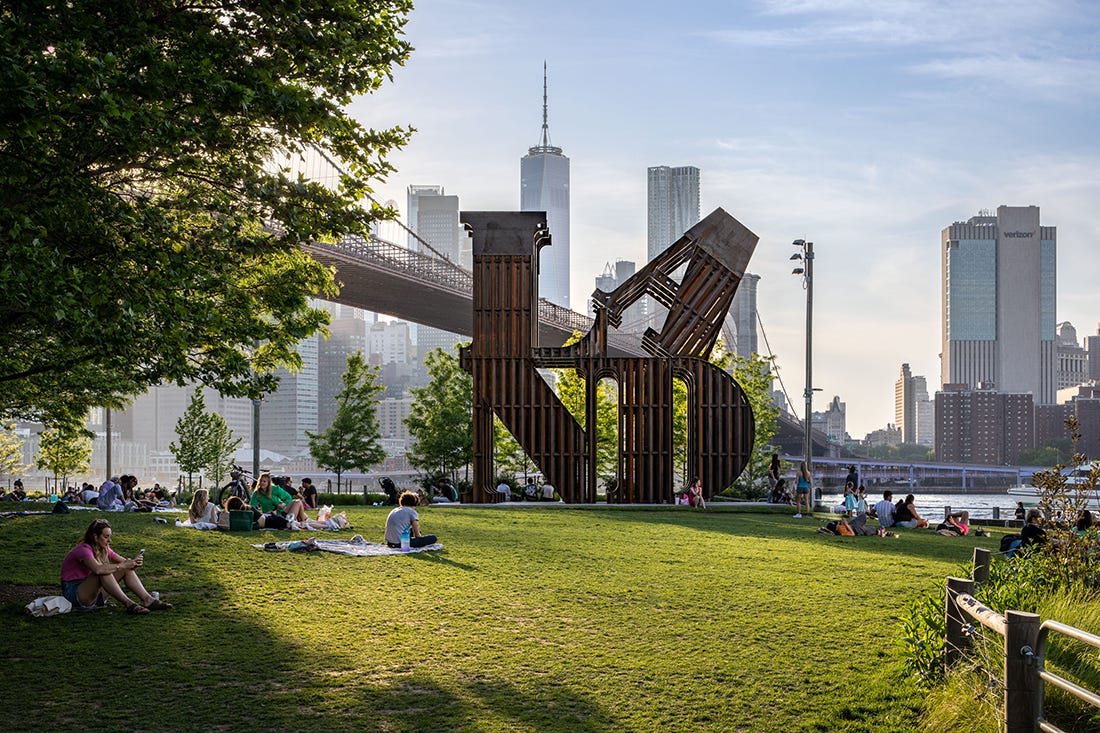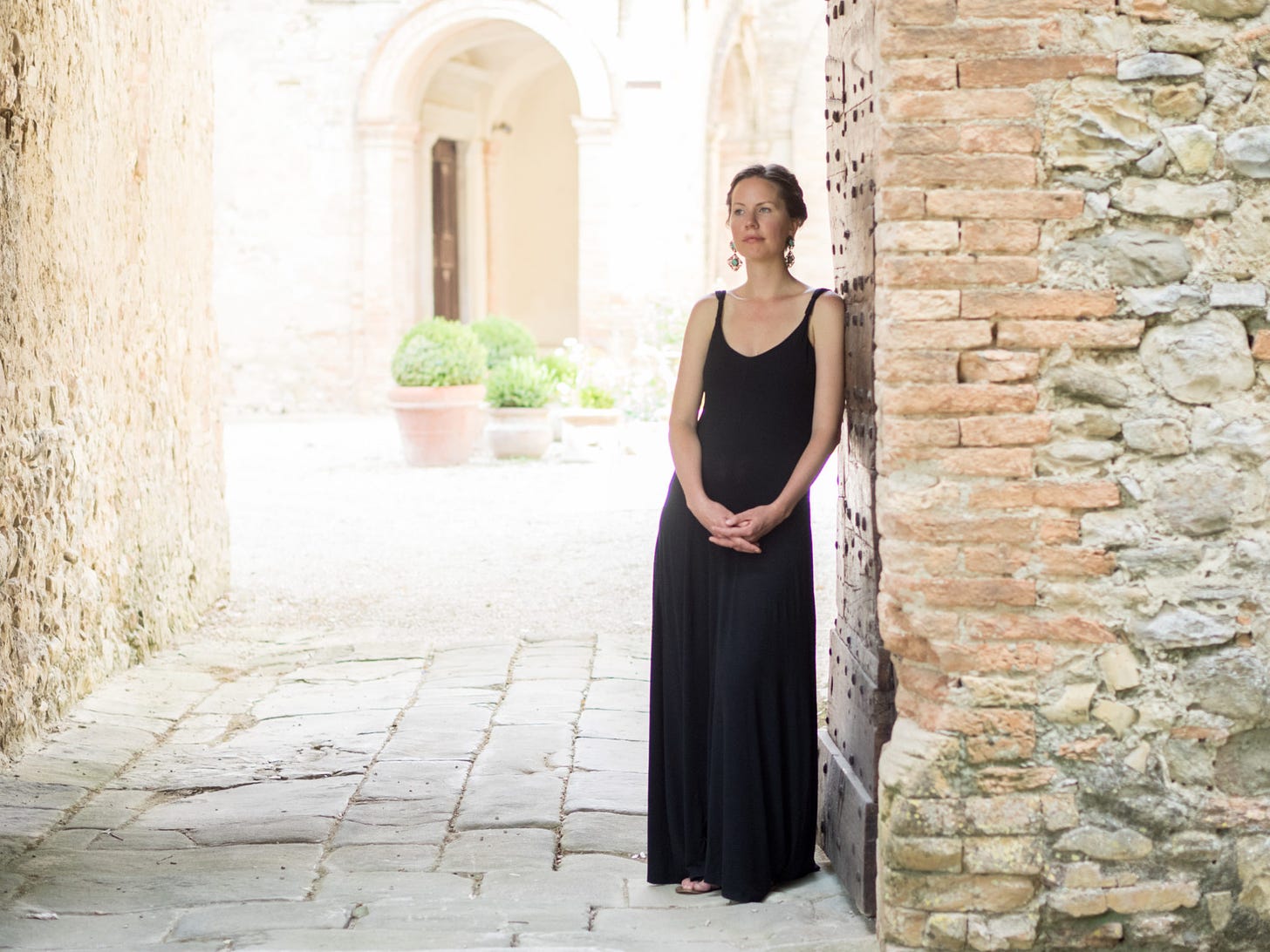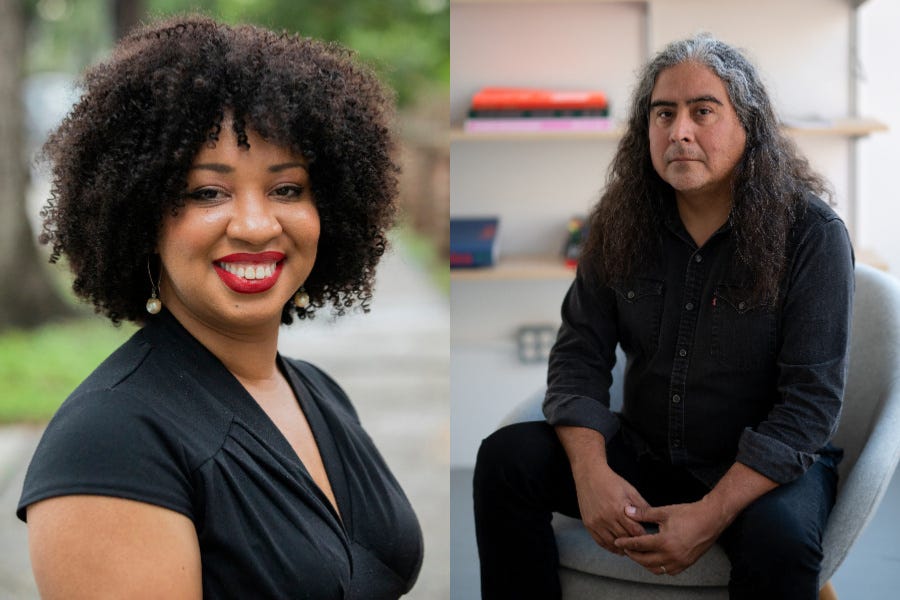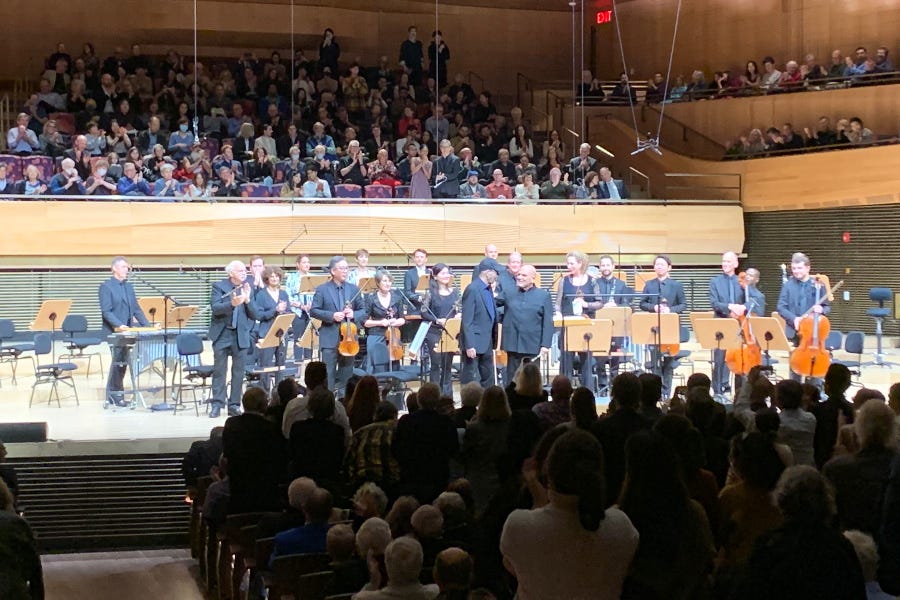So much to say.
Two new MacArthur geniuses, an auspicious premiere from David T. Little, a new Reggio/Glass team-up, and live music highlights for the next seven days.

What feels very much like an oncoming cold tried hard to thwart my efforts to keep this newsletter percolating along on a Tuesday/Friday schedule today. But I’m fighting back to get this one out more or less on schedule.
There’s plenty to say!
Foremost, congratulations to Courtney Bryan and Raven Chacon, the two musicians among this year’s class of worthy new MacArthur Fellows. To my fellow New Yorkers: opportunities to congratulate these remarkable artists in person are imminent. Chacon improvises with violinist and fellow multi-hyphenate artist Laura Ortman on Saturday, Oct. 21 at 5pm at Brooklyn Bridge Park, responding to Nicholas Galanin’s massive sculpture In every language there is Land / En cada lengua hay una Tierra (details here; RSVP here).
Then on Oct. 26 at 7:30pm, Chacon and William Fowler Collins perform as Mesa Ritual, bringing the elemental noise to a wide-ranging False Harmonics bill at Pioneer Works. The headliner is Anthony Braxton with Wolf Eyes, and the show also includes Hieroglyphic Being and MV Carbon. (Phew.) Go here to grab tickets.
Meanwhile, Bryan has an important world premiere just ahead on an International Contemporary Ensemble concert at Merkin Hall, on Nov. 1 at 7:30pm. Titled “Composing While Black, Volume One,” the bill includes Bryan’s DREAMING (Freedom Sounds) and another premiere by Adegoke Steve Colson, MIRRORS.
Completing that program are Brittany J. Green’s Thread and Pull and Wendell Logan’s Runagate, Runagate. I had the privilege of writing about the latter work in The New York Times a little over a decade ago:
“Runagate, Runagate,” by Wendell Logan, sets Robert Hayden’s flamboyant poem about a runaway slave to music of wild ferocity, sobriety, eeriness and mordant wit. Hearing it powerfully sung and shouted here by Robert Mack, a tenor, with fiery accompaniment conducted by Tania León, I could barely fathom how a work so sharply drawn and gripping could languish virtually unknown.
An astonishing work that deserves to be better known, and in mighty auspicious company… hope to see you there.
Out today is my first feature for WRTI, the Philadelphia public radio station whose digital news is overseen by my esteemed colleague and longtime friend Nate Chinen. My article covers SIN-EATER, a provocative new evening-length choral piece by David T. Little, which powerhouse new-music choir The Crossing will perform with the Bergamot Quartet this Saturday and Sunday in Philadelphia. I’d love to be there to hear it, but since I can’t, I’m grateful to know it’s being recorded live.
Read it here.
My review of the concert the New York Philharmonic performed on Friday, Sept. 29 at David Geffen Hall, featuring the New York premiere of The Elements, the composite concerto Joshua Bell commissioned from Kevin Puts, Edgar Meyer, Jake Heggie, Jennifer Higdon, and Jessie Montgomery, appeared last Friday on the Musical America website, here.
I feel obliged to honor the paywall, but here are some choice bits about The Elements…
Yoking together five disparate voices was a calculated risk. But Bell chose shrewdly, engaging individual creators who share a thorough command of craft, an unabashed embrace of lyricism and communicativeness, and a knack for evocative storytelling.
… and the performance…
A tumultuous extended ovation for performers and composers alike on Friday confirmed what was evident already: The Elements is a rousing success and a well-made delight, and Bell an ideal protagonist. Van Zweden was an alert, sympathetic companion, and the orchestra played beautifully throughout this evidently congenial assignment.
… and the account of Aaron Copland’s Symphony No. 3 that followed intermission.
…whether it was due to the orchestra still growing into to its refurbished hall, or to Van Zweden’s well-established propensity for loud, hard interpretations of big works—and despite luminous contributions from orchestra soloists—this latest traversal of a work commonly touted as the “Great American Symphony” had the hectoring quality of a campaign slogan.
The “campaign slogan” bit is gentler than what I originally considered writing, but I decided that moderation trumped sass. (Writing for the Financial Times, George Grella found more to appreciate in the Copland than I did.)
The recent major-orchestra premieres by Philip Glass and Steve Reich, which I wrote about here last week, proved inspired and inspiring encounters. I won’t claim that Triumph of the Octagon, which opened a Chicago Symphony Orchestra concert led by Riccardo Muti at Carnegie Hall, is top-flight Glass. But it was a lovely 10-minute evocation of place and mood, ideally suited to an occasion awash in warm Italian vibes—an early housewarming for Muti’s retirement villa, perhaps. Glass was present for the occasion, and accepted a generous ovation from his spot in the first tier.
On the other hand, Jacob’s Ladder is first-rate Reich, mixing his signature rhythmic snap, penchant for Pérotin, and predilection for sacred texts in Hebrew into a riveting 20 minutes that stand with his best achievements.
Zachary Woolfe analyzes the piece in exacting detail in The New York Times, so I’ll urge you to read his review. My two cents: Recent works have been a marked improvement over earlier efforts, but the symphony orchestra is not Reich’s natural element. Part of what made this piece and performance so effective was the scaled-down, nimble, transparent ensemble he deployed.
It was a joy to see Reich gambol up to the stage to greet a rousing reception from the audience. And after my agita over his previous outing, Van Zweden was measured and persuasive in Reich—and in Beethoven and Schubert, too.
Video of the week.
Filmmaker Godfrey Reggio and composer Philip Glass have formed a durable working relationship over the years, stretching from the iconic Qatsi Trilogy – Koyaaaniqatsi, Powaqqatsi, and Naqoyqatsi – and the short film Anima Mundi, which came between the second and third Qatsi features, through Visitors, a more recent film that somehow escaped my notice altogether. (Granted, 2014 was a busy year.)
Now there’s a new collaboration, Once Within a Time, which just ended a brief run at the Museum of Modern Art, and opens this Friday at the IFC Center in Greenwich Village. The film is co-directed by Jon Kane, who also worked on Naqoyqatsi and Visitors, and judging by the trailer, it looks and sounds different than anything Reggio and Glass have done previously. (Cinephiles take note: Kane and executive producer Steven Soderbergh will be on hand Friday to chat about the film after one screening and before the next.)
This also seems like an opportune time to mention that the Philip Glass Ensemble will accompany a screening of Koyaanisqatsi live in a newly booked engagement at The Town Hall on Wednesday, Nov. 29 at 7pm; details here.
Night After Night Watch.

Concerts listed in Eastern Standard Time.
12
The Hunt
Miller Theater, Columbia University
2960 Broadway, Upper West Side
Thursday, Oct. 12, and Saturday, Oct. 14 at 8pm; $50–$65, seniors $42–$55, students $37–$49
millertheatre.com
Hirona Amamiya, Christiana Cole, and Brett Umlauf star in the world premiere of a new chamber opera by composer Kate Soper, helmed by the ingenious stage director Ashley Tata. The notion of three singers accompanying themselves on ukuleles and violin, spinning a musical yarn tugged out of antiquity with penetrating insight and razor-sharp wit, is a strong reminder of her dazzling 2014 show Here Be Sirens – which also featured Umlauf, and which you can watch in its entirety here – and that’s all the recommendation anyone should need.
Darius Jones
Roulette
509 Atlantic Ave., Brooklyn
Thursday, Oct. 12 at 8pm; $30, advance $25, seniors and students $20
roulette.org
Saxophonist and composer Darius Jones joins forces with members of the music and performance-art collective thingNY (including Gelsey Bell, a featured performer in the just-mentioned Here Be Sirens) to present the world premiere of Jones’s Samesoul Maker, a sequel to his ambitious, enigmatic 2014 a cappella quartet piece, The Oversoul Manual.
The Sundara All-Star Band
MELA Foundation Dream House
275 Church St., 3rd Floor, Tribeca
Thursday, Oct. 12, at 7:30pm, and Saturday, Oct. 14, at 8pm; $53, seniors and students $43
eventbrite.com
La Monte Young, Jung Hee Choi, Jon Catler, Hansford Rowe, and Ben Neill improvise over Choi’s composition Tonecycle for Blues Base 30 Hz, 2:3:7, with Naren Budhkar on tabla and light design by Marian Zazeela.
13
Sirius Quartet 2023 Progressive Chamber Music Festival
Greenwich House Music School
46 Barrow St., Greenwich Village
Friday, Oct. 13 and Saturday, Oct. 14 at 7pm; $25, two-night pass $50
eventbrite.com
Just as the Sirius Quartet has long bucked at the confines of what a string quartet is and does, the group’s iconoclastic festival similarly interrogates the conventional parameters of chamber music. The bill on Friday night features three disparate duos: TreeSearch (violinist Keir GoGwilt and bassist Kyle Motl), bassoonist Sara Schoenbeck and gayageum player DoYeon Kim, and cellist Jake Charkey with tabla player Mir Naquibul Islam; Saturday brings the Sirius Quartet itself, along with pianist Matthew Shipp and Shoko Nagai’s culture-crunching combo Tokala.
14
Forest Song
Inwood Hill Park
Shorakkopoch Rock, Inwood
Saturday, Oct. 14 at 2 and 4pm, Sunday, Oct. 15 at 1 and 3pm; free admission
johnphastings.org/forestsong
Get a dose of new music enhanced with fresh air (hopefully!) this weekend at Inwood Hill Park, where members of TILT Brass are joined by flutists Jessica Schmitz and Eva Ding, clarinetists Iván Barenboim and Katie Porter, and saxophonist Casey Anderson in four accounts of Forest Song, a site-specific musical rite John P. Hastings fashioned for the park, described as “the last, original site of pre-Columbian Mannahatta.”
“The Harvest Time Project: A Tribute to Pharoah Sanders”
National Sawdust
80 N. 6th St., Williamsburg
Saturday, Oct. 14 at 8pm; $38.45–$43.45
nationalsawdust.org
Celebrating the recent Luaka Bop reissue of Pharoah Sanders’s 1977 LP Pharoah, Natural Information Society bandleader Joshua Abrams summons the spirits with an ensemble featuring guitarist Tisziji Muñoz, who played on the original album, plus Jeff Parker, Chad Taylor, and James Brandon Lewis.
16
Jasper Quartet
Americas Society
680 Park Ave., Upper East Side
Monday, Oct. 16 at 7pm; free admission
as-coa.org
The Jasper Quartet celebrates the impending arrival of Insects & Machines, its authoritative, appealing Sono Luminus recording of string quartets by Canadian composer Vivian Fung, with a program juxtaposing music by Bela Bartók and Alfred Schnittke with selections from Fung’s oeuvre, including a preview of a newly commissioned piece.
For even more listings, see the Night After Night Watch master list, here.
Thank you.
(Photographs by the author, except where indicated otherwise.)






Nice to see Inwood in Night After Night! Hope to get to Forest Song.